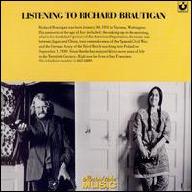The production of Listening to Richard Brautigan was fairly laborious and protracted. Originally the album was intended to be made for Zapple, the short-lived experimental subsidiary of the Beatles' Apple label. Zapple was run by Barry Miles, a respected author in his own right and a big part of the London '60s underground scene as a partner in the Indica Bookshop and publisher of the London paper International Times. It was Miles who proposed the project to Brautigan in late 1968, as part of a series of spoken-word albums he hoped to record by literary figures, including McClure, Henry Miller, Allen Ginsberg, William Burroughs, Anais Nin, Lawrence Ferlinghetti, Robert Creeley, Ezra Pound, Jean Genet, Samuel Beckett, and Gary Snyder.
As was the case with many projects cooked up by Apple in the late 1960s, little of these ambitious plans came to fruition. However, the Brautigan album almost did, with Miles coming to San Francisco in early 1969 to work on the production and recording. The sessions were recorded both in Brautigan's kitchen and at Golden State Recorders, a San Francisco recording studio. The album was considered enough of an impending release that Apple sent Brautigan an advance check, for a grand $200, in March 1969. However, although it reached the acetate stage and a sample sleeve had been done, Zapple, like Apple, was in serious organizational trouble. Only two albums (John Lennon and Yoko Ono's Unfinished Music No. 2: Life with the Lions and George Harrison's Electronic Music) were ever released on the label, which folded before Brautigan's LP was issued, although it had been scheduled to come out in late 1969. By this time relations between Brautigan and Miles were strained since, as candidly noted in Miles' memoir -In the Sixties, the producer had started an affair with Brautigan's girlfriend, Valerie Estes. However, he did try in the early 1970s to place some of the material he had recorded for Zapple, with Brautigan and others, on different labels, and Harvest Records ended up putting out Listening to Richard Brautigan in 1970.
This was the only album Brautigan made before his death in 1984, but he did make a little-known cameo appearance on the 1969 album by the San Francisco Bay Area band Mad River, Paradise Bar and Grill. On this record, he read his poem Love's Not the Way to Treat a Friend, backed by an easygoing country-folk-rock musical track written and performed by the band's lead guitarist, David Robinson. The Brautigan-Mad River connection didn't end there: Brautigan, a fan of the band, had helped them out by buying them food when they were struggling. Mad River, in turn, used some of the advance they got after signing to Capitol to pay for the printing of his novel, -Please Plant This Book. ~ Richie Unterberger, Rovi












